A man is passing: Ode to Tom L Johnson by Edmund Vance Cooke (1912)
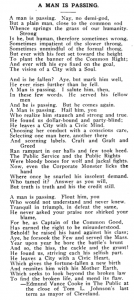
www.teachingcleveland.org
A man is passing: Ode to Tom L Johnson by Edmund Vance Cooke (1912)

Cleveland’s Professional Baseball Stadiums
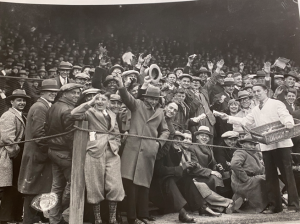
“If you build it, they will come”
by Robyn Marcs, WRHS (March 2022)
With the recent name change of the Cleveland Indians to the Guardians, one may want to reflect on how far our team has come since its founding in 1901. The American League Cleveland team has called three ballparks home: League Park, Cleveland Municipal Stadium, and Progressive Field (also known as Jacobs Field to those of us who grew up with that name).
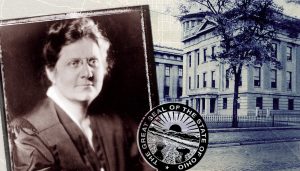
Florence Ellinwood Allen: The First Woman State Supreme Court Justice from The Brennan Center
A century later, her story of perseverance and support from women’s rights activists still inspires.
by Amanda Powers
One hundred years ago, Florence Ellinwood Allen became the first woman to serve as a state supreme court justice. It was one of many firsts throughout her life: she was also the first woman in America to serve as a prosecutor, be elected as a trial court judge, and be appointed to a federal appeals court. Allen overcame numerous barriers based on her gender throughout her legal career, often with the support of grassroots suffragists who rallied behind her. Her achievement is underscored by the fact that there wasn’t another woman on a state supreme court for nearly 40 years.
Allen spent her first year of law school at the University of Chicago, where she was the only woman. She later wrote in her memoir that it was “terrifying to have to enter a classroom first while a hundred men stood aside.” Allen transferred to New York University, which had been accepting women to its law school since 1890. There, she described feeling “on equal terms with men” and became involved in the women’s suffrage movement.
Allen graduated law school second in her class in 1913 and returned home to Ohio, where she opened a private law practice, volunteered for the Legal Aid Society, and continued campaigning for suffrage. While advocating for a ballot initiative to grant Ohio women the right to vote, Allen gave speeches in 88 counties across the state. She later argued and won a case before the state supreme court that granted women the right to vote in municipal elections, although the policy was soon overturned by referendum. In 1919, Allen was appointed as a prosecutor in Cuyahoga County, a national first for a woman.
Just 10 weeks after the ratification of the 19th Amendment in 1920, Allen was elected to the Cuyahoga County Court of Common Pleas and became the first woman elected to judicial office in the country. Because she entered the race late, she had to collect signatures to be listed on the ballot. Her friends in the Woman Suffrage Party circulated petitions throughout the county and collected enough signatures to complete the nomination process. Upon Allen’s election, her male colleagues on the court suggested that she should only rule on marital disputes. Allen disagreed, responding that since she had never married, “she lacked sufficient expertise in the domestic domain,” unlike the men on the bench.
The women’s movement remained deeply involved throughout Florence’s tenure on the court. When Allen called attention to disorganization at the court due to the lack of a chief justice, women’s groups contacted the press and organized mass meetings to raise awareness of the problem. Allen later wrote that this burst of civic engagement among women occurred “because for the first time they were serving on the jury and also because they saw a member of their sex sitting on the bench . . . in a way that made them feel a special ownership in the Court of Common Pleas.”
In 1922, Allen ran for a seat on the Ohio Supreme Court. She was the underdog against a decorated World War I veteran backed by the powerful state Republican party. However, Allen prevailed by a significant margin. Her campaign was driven by “Florence Allen clubs,” which had been organized by suffragists in almost every single Ohio county. Allen relied on this network of volunteers to circulate petitions, organize door-to-door canvassing, schedule speaking engagements, and secure endorsements from local newspapers.
 Library of Congress
Library of CongressAllen wrote in her memoir that on her first day on the bench, she “was aware of a certain uneasiness among the men” due to her gender. Allen overcame their uncertainty and asserted her judicial authority during her 11 years on Ohio’s highest court, issuing decisions on questions of education, labor, municipal governance, taxes, and more.
In 1928, the Florence Allen clubs returned in force, and Allen was reelected by a margin of some 350,000 votes.
After unsuccessful campaigns for the U.S. Senate and House, Allen was nominated by President Franklin D. Roosevelt to the U.S. Court of Appeals for the Sixth Circuit in 1934. She faced considerable opposition throughout the confirmation process but found support from unlikely allies. Ohio Supreme Court Justice Will Stephenson, who had staunchly opposed the idea of a woman justice when Allen was first nominated to share the bench with him, traveled to Washington to testify that “there is no Court too big for Judge Allen.” Allen was confirmed by the Senate, becoming the first woman to sit on a federal appeals court bench. She remained in this position for 25 years.
On the Sixth Circuit, Allen maintained that her role as a judge should not be impacted by her gender. Upon noticing that the chief judge was not assigning her to hear any cases involving patents, Allen insisted that she no longer be excluded from this category. She later wrote several opinions on patent-related cases that were affirmed by the Supreme Court.
Allen received national attention when she presided over a three-judge panel in the case of Tennessee Electric Power Co. v. Tennessee Valley Authority, ruling that the federal government had the authority to build dams and reservoirs and regulate interstate commerce on interstate waterways like the Tennessee River.
This case raised Allen’s national profile, and she was considered for the Supreme Court by several presidents. Many allies called for Allen to be nominated, including First Lady Eleanor Roosevelt, who wrote in her newspaper column in 1948, “if a President of the United States should decide to nominate a woman for the Supreme Court, it should be Judge Allen.”
Florence Ellinwood Allen was a trailblazer who understood the importance of diversity in the courtroom. In her words, “When women of intelligence recognize their share in and their responsibility for the courts, a powerful moral backing is secured for the administration of justice.”
A century after her election to the Ohio Supreme Court, Allen’s story reminds us of the importance of a representative judiciary to affirm the legitimacy of a system that administers justice for all. There is still much work to be done on that front: as of last year, only about one-third of active lower federal court judges were women, and 12 states had only one woman on the bench of their state supreme court.
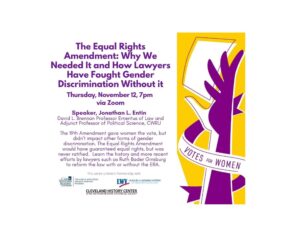
The Equal Rights Amendment: Why We Needed It and How Lawyers Have Fought Gender Discrimination Without it
Jonathan L. Entin, David L. Brennan Professor Emeritus of Law and Adjunct Professor of Political Science, Case Western Reserve University
Thursday, November 12, 7pm via Zoom
The videos here:
Gender-based distinctions used to pervade American law. The ratification of the Nineteenth Amendment gave women a constitutional right to vote, but did nothing to disturb other forms of gender discrimination. The Equal Rights Amendment would have guaranteed equal rights regardless of sex, but was never ratified. This program will examine the historical background of gender distinctions in the law and more recent efforts by lawyers such as Ruth Bader Ginsburg to reform the law with or without the ERA.
Zoom RSVP here:
https://cwru.zoom.us/webinar/register/WN_yhNoIuuGQ86ACD22VrG_sQ
Free
Made possible with a generous donation from Lin Emmons.
Sponsored by Cleveland History Center, CWRU Laura and Alvin Siegal Lifelong Learning, League of Women Voters-Greater Cleveland
“The Kid From Cleveland” 1949 film set in the CLE – YouTube
Excellent footage of 1940s Cleveland
Summary of Video forum from May 21, 2020 by Briana Oldham
The pdf is here
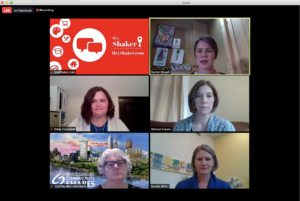
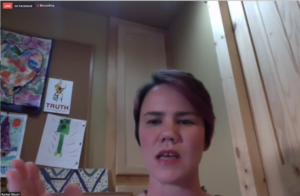 Rachell Dissell, moderator, Emily Campbell, Assoc Director, Center of Community Solutions, Melissa Graves, CEO, Domestic Violence & Child Advocacy Center, Cynthia J. Ries, Exec Director, Greater Cleveland Community Shares, Sondra Miller, President & CEO, Cleveland Rape Crisis Center
Rachell Dissell, moderator, Emily Campbell, Assoc Director, Center of Community Solutions, Melissa Graves, CEO, Domestic Violence & Child Advocacy Center, Cynthia J. Ries, Exec Director, Greater Cleveland Community Shares, Sondra Miller, President & CEO, Cleveland Rape Crisis Center
How Cleveland nonprofits plan to survive COVID-19
by Briana Oldham
COVID-19 has changed everything. Creating a new landscape for the future comes with adjusting to the times.
In a forum held Thursday night, a panel of representatives from several nonprofits in the city of Cleveland came together to discuss the impact of COVID-19 and how to adapt to the new normal.
The hour-long discussion, presented by the Shaker Heights Chapter of the League of Women Voters Greater Cleveland opened with remarks from former Plain Dealer reporter, Rachel Dissell.
How can nonprofits continue to deliver services to Cleveland residents during a global pandemic?
Panelists Emily Campbell, Associate Director from the Center for Community Solutions, Melissa Graves, CEO of the Domestic Violence & Child Advocacy Center, Sondra Miller, President & CEO of the Cleveland Rape Crisis Center, and Cynthia J. Ries, Executive Director of the Greater Cleveland Community Shares took to Zoom to answer this and so much more.
Graves, who has spent her career working with vulnerable families, noted that decisions on how to provide services during this time were made immediately. Due to all the uncertainty right now, which abusers don’t like, the center felt it best to keep critical services open.
“We knew it was going to be a very volatile and dangerous situation [having abusers at home around the clock] so we pivoted very quickly,” Graves said.
What Graves and the staff found when trying to provide remote services was that it forced the center to go in a direction that they had already been moving toward but had yet to complete. The staff has been able to attend virtual trainings and webinars to provide advocacy services to work with clients remotely.
“There is a curiosity around what’s been happening with domestic violence and child abuse,” Graves said.
With that idea in mind, the mission is now more important than ever, and their efforts have been well received. Since people still need housing, the center has also worked diligently to expedite permanent housing in order to provide some level of social distancing.
Pivoting was a resounding theme during the forum, as several agencies had to move to immediately decide how to proceed and without a lot of information at the time.
The Center for Community Solutions conducted a survey about problems agencies were facing and how they were dealing with them. Campbell wanted to look at data to get a sense of if the reports they received were across the board or just in some area pockets.
There were 734 groups across the state of Ohio over the span of two weeks in late April who participated in the survey. Though all 88 counties were represented, the core of the responses came from Cuyahoga County where community solutions has the deepest reach.
The biggest question was what the level of disruption was on the various agencies due to COVID-19 and/or the Stay at Home Order.
“We thought it was important to ask about those two things together because what we’re seeing is that it’s not just about the virus, it’s the response to the virus as well,” Campbell said.
What they found was the vast majority of service providers reported their services had been disrupted. Though 38% indicated that there was some disruption, but it was manageable, 20% listed significant disruption and they expect the return to services to be difficult.
“We are most concerned with the 20% because these are the groups that have faced some real challenges over the course of the last two months,” Campbell said.
A big takeaway was that over 75% reported shifting to providing services over the phone or via video chat as a way to adjust. The responses came from agencies ranging from a staff size of five people to those with over 500 employees.
There are pivots that pertaining to certain agencies had to make that most others might not have had to consider. This holds true for the Cleveland Rape Crisis Center due to the inability to have in person visits and provide emergency room support.
Miller described coming up with goals at the beginning of the year to transition to providing services via telehealth but didn’t think they would be implemented so quickly. Telehealth is the ability to provide health services and support electronically using various means of technology.
“Staffing clients who started out being a little bit resistant to it, came to really enjoy it and feel like that it was an even better experience,” Miller said.
Some chose not to participate, as this method of receiving advocacy is not for everyone. The center also had to navigate the hospital emergency rooms since there were a lot of mixed reactions to new protocols in place.
Miller believes there is an opportunity for telehealth services to continue, especially in parts of the state where they do not have 24-hour sexual assault nursing units.
“I see telehealth being woven into what the future could look like there,” Miller said.
Financial challenges agencies are facing have also become a huge topic of discussion when it comes to nonprofits. Ries began to hear from agencies the Greater Cleveland Community Shares partners with and serves almost immediately at the peak of the pandemic.
Ries mentioned getting a lot of calls and a lot of questions. This is in large part due to most of the members being performing arts groups. Ries notes there being a lot of anxiety about canceled events and what that means for funders.
Though many organizations received loans, the help provided only temporary relief and what the future looks like would still need to be addressed.
“I think what we’re going to see in the next couple months and next year is that fundraising is definitely going to be different,” Ries said.
Ries thinks Cleveland is a generous community and will rally together. She mentions that several foundations have already stepped up and that it has been impressive to watch.
The arts groups have gotten creative when coming up with ways to serve young people and keep them connected and engaged.
“Our arts groups, our members have really stepped up, and have been doing great community based, family based, meaningful work,” Ries said.
The concept of community shares is the idea of being able to help each other. People still have the desire to do this even during such an unprecedented time and it is clear the support is a mighty force.
##
How will some of Cleveland’s most critical non profits survive Covid-19?
A video forum on May 21, 2020
with Rachel Dissell, former Plain Dealer Reporter and panelists:
•Emily Campbell, Assoc Director, Center of Community Solutions
•Melissa Graves, CEO, Domestic Violence & Child Advocacy Center
•Sondra Miller, President & CEO, Cleveland Rape Crisis Center
•Cynthia J. Ries, Exec Director, Greater Cleveland Community Shares
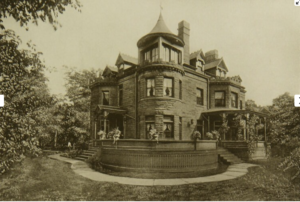
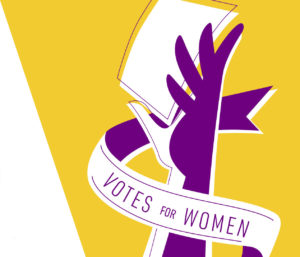
the series flyer is here
Another series flyer is here
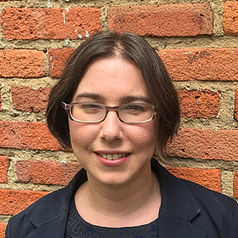
Thursday February 27 7-8:30 p.m.
This talk will explore how the local activism of women in various reform causes in Cleveland and elsewhere led to their involvement in the suffrage movement, thus situating the right to vote in a broader activist agenda to advance women’s rights and equality before and after the ratification of the 19th Amendment. This series is held in partnership with The Laura and Alvin Siegal Lifelong Learning Program Case Western Reserve University and the League of Women Voters of Greater Cleveland.
Free and open to the public.
RSVP here
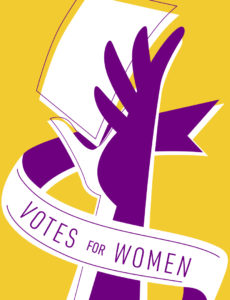


Angela Clark-Taylor
Director, Flora Stone Mather Center for Women, CWRU
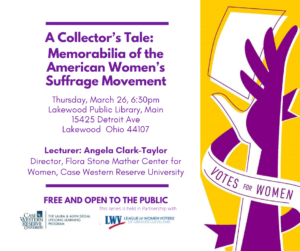
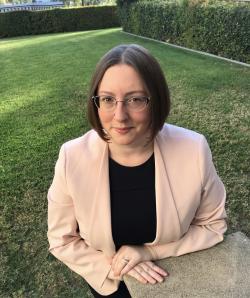
Talk will be at Lakewood Public Library, Main
15425 Detroit Ave, Lakewood, OH 44107
Thursday March 26 6:30 – 8 p.m.
This interactive lecture will utilize artifacts and ephemera from the American Women’s Suffrage Movement and the Anti-Suffrage Movement to provide a brief history of women’s suffrage and the memorabilia suffragists created to develop a mainstream market appeal for their movement to the American people. This series is held in partnership with The Laura and Alvin Siegal Lifelong Learning Program Case Western Reserve University and the League of Women Voters of Greater Cleveland.
Free and open to the public.
RSVP here
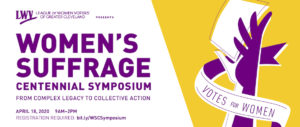



Heather Hurwitz
Lecturer, Sociology, CWRU

Talk will be at One University Circle
10730 Euclid Ave, Cleveland, OH 44106
Wednesday May 20 6:00 – 7:30 p.m.
This talk will explore the range of social movement activism that women have engaged in since the passage of the 19th amendment. Topics include the pursuit of racial and gender equality, women in environmental movements, feminists in the Occupy movement, and more. Since suffrage, women have continued to fight for equality even within progressive movements. This series is held in partnership with The Laura and Alvin Siegal Lifelong Learning Program Case Western Reserve University and the League of Women Voters of Greater Cleveland.
Free and open to the public.
RSVP here
Cosponsored by


Morrie Zryl brought pizzazz and showmanship to movie theaters: An appreciation Obit
– Jan 24, 2019 Plain Dealer
By Joanna Connors,

CLEVELAND, Ohio – In July of 1981, Morrie Zyrl gave Clevelanders a taste of true showmanship.
Zryl, who had just taken over the moribund Colony Theater in Shaker Square, had to work harder than other theater managers to bring audiences to a theater that had been closed, except for the occasional special event, for years. He had to work harder to book movies with Hollywood distributors, too, who balked at giving him a shot at first-run films in a theater with only one screen.
His solution was to take advantage of the Colony’s 70mm projector, one of only three in northeast Ohio at the time, and show movies on a second-run basis in their full, big-screen glory. He backed up that strategy with old-fashioned promotional pizzazz.
One of the first movies he booked, Francis Ford Coppola’s 1979 Vietnam epic, “Apocalypse Now,” had come and gone from the area’s multiplexes two years earlier. So Zryl rented a huge helicopter, attached giant speakers to it, & sent its pilot buzzing over the city blasting “The Ride of the Valkyries,” the soundtrack to the film’s most indelible scene, the helicopter cavalry attack orchestrated by Robert Duvall’s unhinged Capt. Kilgore.
To borrow the line from Kilgore: Zryl loved the smell of popcorn in the evening.
Zryl, who died in Florida on January 16 at the age of 69, loved everything to do with movies. He told a reporter from The Plain Dealer in 1988 that he caught the bug when he was 3 years old and living in Israel with his parents, both Holocaust survivors. They took him to see “Gone with the Wind,” and his romance with the movies began.
It continued in Cleveland, where his parents moved when he was 8 years old. At 14, he got a job as an usher at the Cedar Lee Theater, became assistant manager of the Colony when he was still a teenager, and from there went on to work as a theater manager, a specialty film distributor and the owner or operator of several Cleveland theaters, including the Colony, the Centrum on Coventry Road in Cleveland Heights, Tower City Cinemas and the Fairview.
To each theater, Zryl brought his irrepressible zeal for promotion and zany stunts.
“He was this P.T. Barnum figure to me,” remembered Cindy Barber, the co-owner of the Beachland Ballroom, who met Zryl in the 1980s when he was running the Colony and she sold ads for the Cleveland International Film Festival’s program guides. As Barnum said, “Nobody ever made a difference by being like everyone else.”
Zryl, as many who knew him have said, was a showman. The lobby of his theater was his stage.
When he booked “The Wizard of Oz,” at the Colony, he dressed up as the Tin Man, spray painting his face silver. “One little girl looked at me and said, ‘The Tin Man didn’t have glasses or a beard,’” he told a Plain Dealer reporter. “I told her, ‘He aged.’”
For a 1982 showing of Abel Gance’s restored 1927 masterpiece “Napoleon,” Zryl dressed as the Little General himself. “I’m the right size,” he told The Plain Dealer’s gossip columnist, Mary, Mary, referring to his own rather short stature. “And it does give me a feeling of power.”
And before a big-screen showing of “Ben-Hur” in 1982, he planned the obvious Zryl stunt, given that the Colony is located on Shaker Square. “I’ve already located two chariots,” he told a Plain Dealer reporter. “Fortunately, we have a round square here.”
“He was very good at getting free publicity,” said Jonathan Forman, the owner of Cleveland Cinemas, whose Cedar Lee Theater competed with the Colony for both audiences and film bookings. “He was nutty, but I would admire somebody who took their job that seriously. I thought it was very clever.”
John Ewing, the director of the Cleveland Cinematheque at the Cleveland Institute of Art, said, “Morrie was clearly bitten by the bug in the ’50s and ’60s, when movies meant big-screen entertainment and prestige presentations and so forth. What I liked and respected about him was he had a sense of what was important and would make a great presentation.”
The press certainly loved him. One Plain Dealer columnist called him “the human equivalent of a perpetual motion machine.”
This was not hyperbole.
When Zryl lost the lease to the Colony Theater in 1991, in part because he opposed chopping the big theater into five smaller theaters, he teamed up with developer Charles Zuchowski to renovate and reopen the movie theater on Coventry Road in Cleveland Heights. Zryl and Zuchowski rechristened it the Centrum Theater. and the renovation won plaudits from Plain Dealer architecture critic Steven Litt when it opened in 1992. Litt, who considered the Colony’s multiplex renovation a disfigurement of a grand Art Moderne space, said the Centrum was a triumph.
“Without question the Centrum is one of the best places in greater Cleveland to see movies,” he concluded. “Architecture is the reason. As Zryl rightly says: ‘The place is part of the show.’”
In addition to running theaters, often several at a time, Zryl was active in the Jewish communities of both Cleveland and South Florida, and was the Second Generation president of the Kol Israel Foundation here.
He was able to combine his faith and his passion for movies when he took over managing the Hanna Theater in 1986, before it was renovated and officially became part of the Playhouse Square complex. The first film he booked was “Shoah,” the monumental, 9 ½-hour Holocaust documentary directed by Claude Lanzmann.
When he moved to Florida in the early 1990s and managed a multiplex in Boca Raton, Zryl championed the Steven Spielberg film “Schindler’s List.” He called it “the ultimate film of the Holocaust” and spoke about it to audiences before screenings.
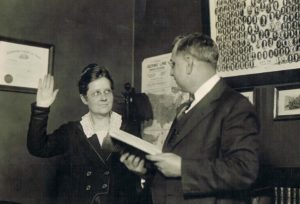 Florence Ellinwood Allen is sworn in as a Common Pleas Court Judge for Cuyahoga County in 1921. Prior to her historic election to the trial court bench, Allen, a mean piano player, wrote music criticism for The Plain Dealer. (Kent State University at Ashtabula)
Florence Ellinwood Allen is sworn in as a Common Pleas Court Judge for Cuyahoga County in 1921. Prior to her historic election to the trial court bench, Allen, a mean piano player, wrote music criticism for The Plain Dealer. (Kent State University at Ashtabula)
Before RBG, a Cleveland judge made history; it’s time to recognize Unstoppable Florence Allen: Andrea Simakis
Plain Dealer June 30, 2019
The link is here